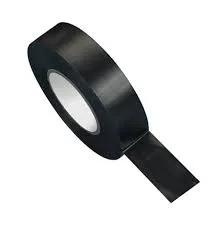Understanding HV Insulation Tape A Comprehensive Guide
High voltage (HV) insulation tape is a crucial component in the electrical industry, particularly when dealing with systems that operate at high voltages. This specialized tape is designed to provide electrical insulation, mechanical protection, and environmental resistance in various applications, ensuring operational efficiency and safety.
What is HV Insulation Tape?
HV insulation tape is typically made from materials like PVC, rubber, or silicone, depending on the specific requirements of the application. The tape is designed to withstand high electrical stress while maintaining its integrity over time. Most HV insulation tapes are characterized by their excellent dielectric properties, which prevent electrical leakage and short circuits.
Key Features
1. High Dielectric Strength One of the primary functions of HV insulation tape is its ability to withstand high voltage without breaking down. This is critical for preventing electrical failures and safety hazards.
2. Temperature Resistance Many HV insulation tapes can operate in extreme temperatures, ensuring performance in various environmental conditions. This is particularly important in industries such as power generation and electrical distribution, where equipment may be exposed to variable climatic conditions.
3. Flexibility and Conformability HV insulation tape is designed to adhere well to irregular surfaces, allowing for easy application on cables, wires, and other components. Its flexibility ensures that it can wrap around different shapes without losing its insulating properties.
4. UV and Chemical Resistance Many HV insulation tapes are engineered to resist the degradation caused by ultraviolet (UV) light and chemical exposure. This ensures that the tape maintains its protective qualities, even in harsh environments.
5. Durability and Longevity With enhancements in material technology, modern HV insulation tapes are designed for long-term use, reducing the need for frequent replacements and maintenance.
hv insulation tape

Applications of HV Insulation Tape
HV insulation tape serves various applications across different industries
. Here are some notable uses1. Electrical Wiring In electric power systems, HV insulation tape is often used in the insulation of wires and cables to prevent electrical discharge.
2. Transformers and Switch Gear The tape is commonly employed in transformers and switchgear assemblies, offering protection and insulation to ensure reliable operation.
3. Repair Work HV insulation tape is often used for emergency repairs on damaged cables and wires, providing a quick solution to maintain system integrity.
4. Industrial Equipment In industrial settings, HV insulation tape can protect machinery components from electrical shorts and environmental damage.
5. HV Substations In substations, HV insulation tape helps in the insulation of bus bars and other high voltage connections, safeguarding the entire electrical installation.
Conclusion
HV insulation tape is an indispensable tool in maintaining the reliability and safety of electrical systems operating at high voltages. Its unique features and diverse applications make it a preferred choice for professionals in the electrical industry. As technology continues to evolve, innovations in the materials and production of HV insulation tape are likely to enhance its capabilities even further. Understanding the importance of HV insulation tape not only helps in selecting the right product for specific applications but also ensures that electrical systems remain safe and efficient in their operations. Whether you are managing a power grid or involved in electrical repairs, choosing the right HV insulation tape will significantly contribute to the longevity and reliability of your electrical systems.
-
XIANGFAN Rubber Tape-Ultimate Solutions for All Your Insulation NeedsNewsJun.24,2025
-
XIANGFAN Rubber Tape-Protection for Industrial and Residential ApplicationsNewsJun.24,2025
-
XIANGFAN Rubber Tape: Superior Safety and Sealing for Demanding EnvironmentsNewsJun.24,2025
-
XIANGFAN Rubber Tape: Reliable Solutions for Every Electrical ChallengeNewsJun.24,2025
-
XIANGFAN Electrical & Industrial Tape: Powering Reliability Across IndustriesNewsJun.24,2025
-
XIANGFAN Electrical & Industrial Tape: Excellence in Every ApplicationNewsJun.24,2025
